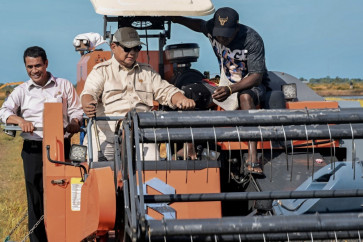Popular Reads
Top Results
Can't find what you're looking for?
View all search resultsPopular Reads
Top Results
Can't find what you're looking for?
View all search resultsIndonesia readies plans for UN seat
In case it secures a non-permanent seat on the United Nations Security Council, Indonesia has been finalizing its positions and strategies on various issues, including on fringe security threats
Change text size
Gift Premium Articles
to Anyone
I
n case it secures a non-permanent seat on the United Nations Security Council, Indonesia has been finalizing its positions and strategies on various issues, including on fringe security threats.
Jakarta wants to highlight eight so-called non-traditional threats if it gets the seat, which will be decided in a vote on June 8.
The eight issues are climate change, energy shortages, gender inequality, displaced persons, diseases, cybercrime, disaster and transnational organized crime.
“The eight formulations are still too general to be Security Council concerns as they have usually been deliberated in other of the United Nation’s main bodies, like the Economic and Social Council,” the Foreign Ministry’s director general for multilateral cooperation, Febrian Ruddyard, told The Jakarta Post on Wednesday.
As an example, Febrian cited Hurricane Matthew, which hit Haiti in 2016. It was widely considered the most lethal Caribbean storm in a decade, but was not be classified as a non-traditional threat to peace and security even though it killed more than 400 people. However, it became a Security Council concern as the Haitian government struggling to rebuild the nation, he said.
“That could be referred as a non-traditional security and peace threats, which should be noticed by the Security Council,” he said, adding that the council issued Resolution 2350 in 2017 in response to Haiti’s situation.
Moreover, he said, Indonesia wants to bring up its forthcoming positions and strategies on non-traditional threats with the UN’s 193 member nations in the General Assembly where they would be more inclusively discussed.
Hence, the issues must be formulated in a way that is convincing for all the states, he said.
“If they are proposed in Security Council discussions, policies would only be made by its 15 member states. In that case, the decisions would likely be more political,” he said, adding that “All policies in the UN are taken based on political purposes”.
Febrian explained that the positions and strategies, discussed in a study-based report, were a collaboratively formulated between the ministry’s Policy Analysis and Development Agency (BPPK) and Parahyangan University’s Center for International Studies (PACIS).
In a recent discussion, the BPPK and the ministry provided feedback on the analysis.
“The discussions are needed to set Indonesia’s positions and strategies on the issues. Hence, if we are elected, we would be ready with the stances as there would be no more time for such deliberations,” Febri said.
Separately, Yulius Purwadi from PACIS explained that both institutions had been cooperating for two years over the issues.
Last year, he said, they discussed traditional challenges like civil wars. In the deliberation, they had set the Palestinian conflict and Syria’s civil war as its priorities, followed by other problematic issues in the Middle East.
“This year, we have been asked to suggest non-traditional threats,” he said. “However, we were advised that some issues can be Security Council concerns when they impact on global security and peace.”
The researchers were also told to analyze possible peace and security instability in developing and least-developed countries.
Yulius said the researchers are using the feedbacks to reformulate the final report, which is supposed to be finished by July so it can be presented in the General Assembly in August.
Citing the report, Indonesia is likely to take four positions and strategies.
Among them is for the country to be a voice for developing and less-developed countries, including Haiti, Somalia, Ethiopia, in the Security Council, especially to reduce the impacts of disasters that cause a political breakdowns and conflicts in the regions.










